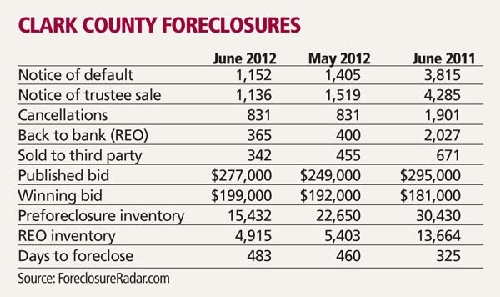Default notices on homes in Clark County dip in June
Default notices filed against Clark County homeowners dropped 18 percent in June, while homes taken back by the bank fell by 8.8 percent, ForeclosureRadar.com reported.
Foreclosure starts declined in every Western state except Washington, where they increased 2.8 percent in June, the Discovery Bay, Calif.-based foreclosure tracking website found.
Foreclosure sales were down significantly in the three largest foreclosure states. Arizona had an 18.5 percent decline, Nevada 14.6 percent and California 13.4 percent.
The change for Nevada is even more dramatic when compared with a year ago, before the robo-signing law that requires lenders to provide affidavits of authority to foreclose took effect.
In Clark County, notice of default filings - the start of the foreclosure process - fell to 1,152 in June, a 69.8 percent decrease from 3,813 in the same month a year ago. Notices of trustee sale, which serve as the homeowner's final notice before auction, decreased to 1,136 in June, down 73.5 percent from 4,285 a year ago.
Of the homes that went to trustee sale in Clark County, 831 were canceled, 365 went back to the bank as real estate-owned homes and 342 were sold to a third party, typically an investor.
"It's the same trend. There's very little going on outside HOA foreclosures," ForeclosureRadar Chief Executive Officer Sean O'Toole said. "We already have significantly low home sales in the market today and with the declining level of foreclosure sales, the inventory will continue to decrease."
Real estate-owned, or bank-owned, inventory in Clark County is down to 4,915 in June, compared with 13,664 a year ago. Preforeclosure inventory, or homes that have a notice of default but have yet to be scheduled for trustee sale, decreased by nearly 60 percent from a year ago to 15,432 in June.
Even in California, which doesn't have the robo-signing law, foreclosure sales in June were half of what they were nine months ago, O'Toole said.
Nevada Attorney General Catherine Cortez Masto said the robo-signing law is not stopping banks from foreclosing on homeowners in default.
"Banks are using (Assembly Bill) 284 as an excuse so they don't have to take a hit on the books," Masto said Wednesday at a panel presented by the National Association of Hispanic Real Estate Professionals at the Gold Coast. "By repealing 284, you're going to bring back massive robo-signing."
California Gov. Jerry Brown on Wednesday signed into law the Homeowner Bill of Rights, which is similar to Nevada's robo-signing law. Among other things, it's aimed at "dual tracking," which has resulted in homeowners getting foreclosed upon while they're in the loan modification process.
That happens when two separate divisions of the same bank don't communicate with each other, Masto said.
The California law is not nearly as onerous as Assembly Bill 284, O'Toole said.
"Fortunately, this bill was watered down significantly from its original form, so we don't expect it will have the same impact that we've seen from more aggressive legislation in Nevada," he said.
"Any impact on foreclosures sales is more than a year away based on current foreclosure time frames," O'Toole said. "The most ironic part of this bill's passage is that foreclosures have already plummeted, and that the real housing crisis in now a lack of homes available for sale."
Contact reporter Hubble Smith at hsmith@reviewjournal.com or 702-383-0491.






















